








Photo Report
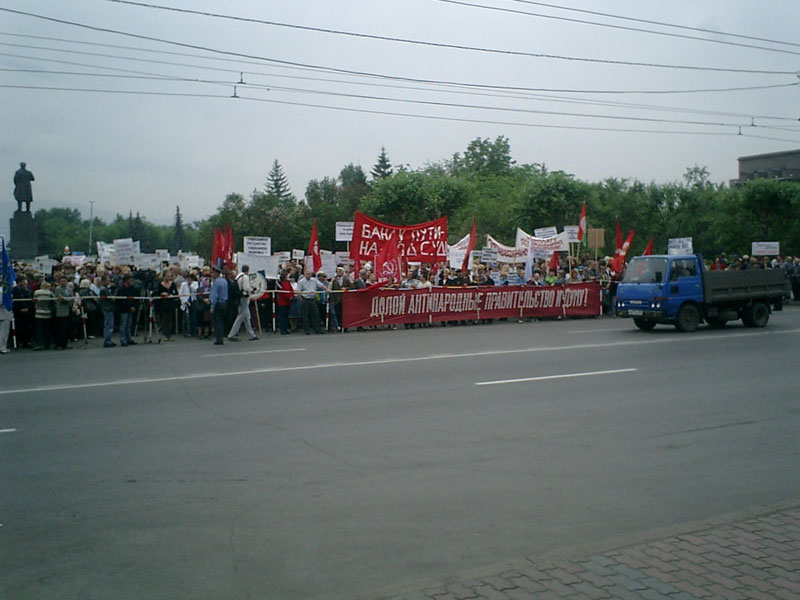
Who would believe it possible that „Memorial“ took part in one and the same
protest campaign together with Communists?
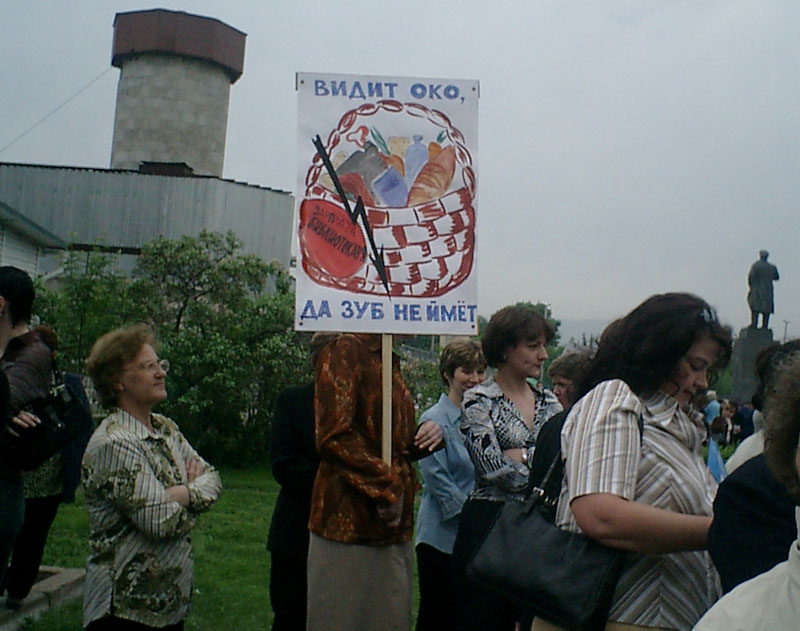
But the people „are already sick“ of those at present in power!
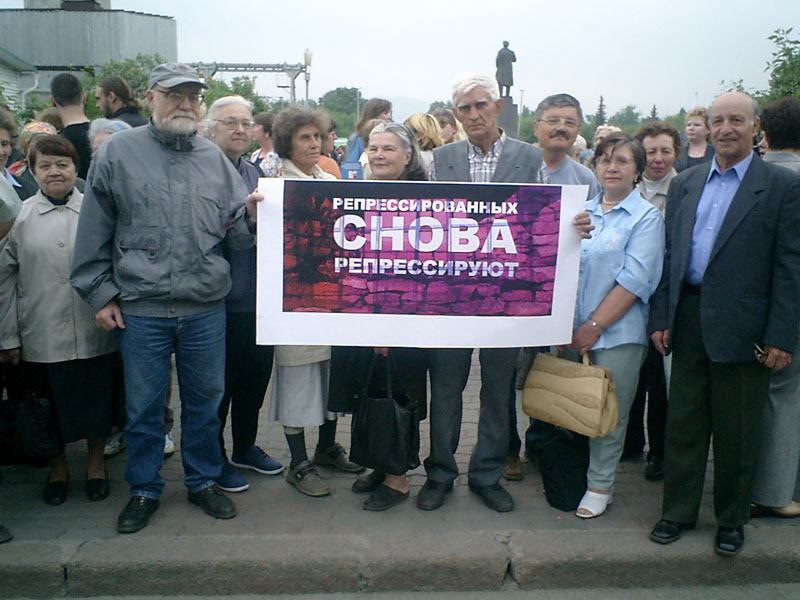
„Memorial“ took to the streets jointly with the Krasnoyarsk Association of
the Victims of Political Reprisals
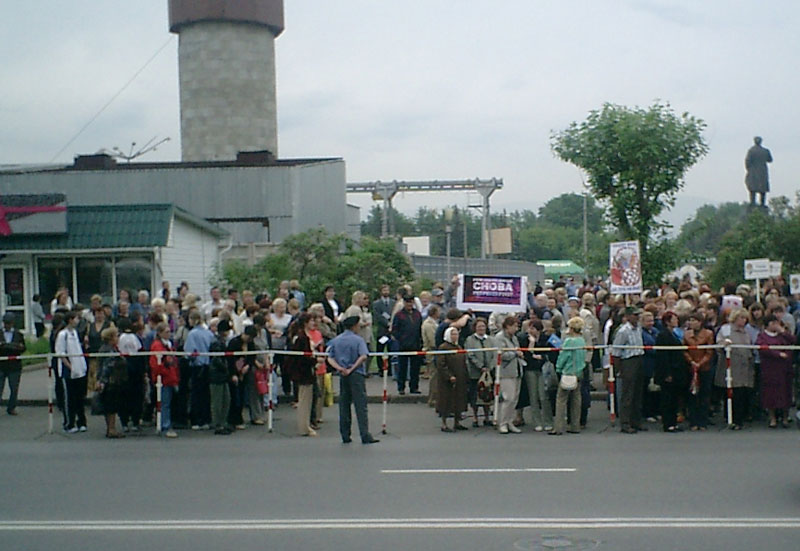
Of course, we did not join the group of the most hot tempered people ...
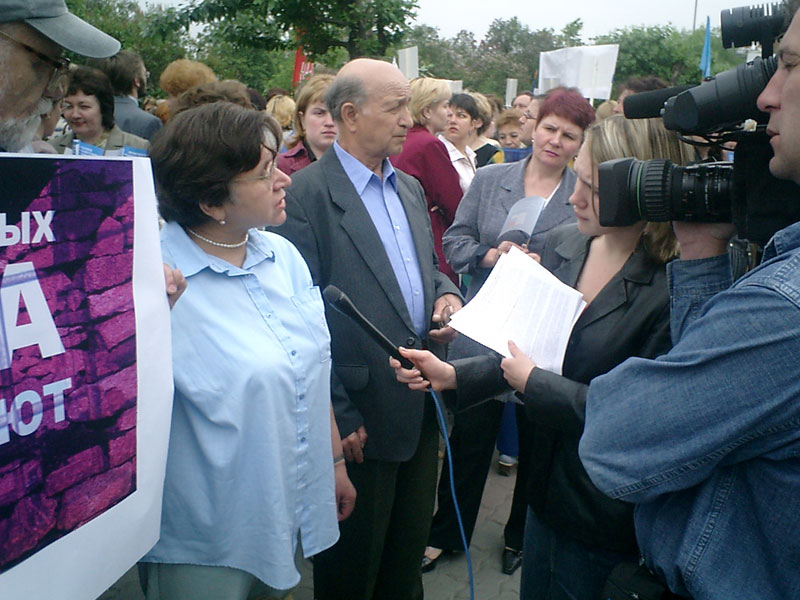
But we said all we had to say!
In the 20th century the State committed outrageous crimes. Millions of people perished from mass hunger, lost their lives in camps behind barbed-wire fences. Millions of people, who were chased away from their lands, who suffered greatly from forced labour. The government of the Russian Federation is not of the opinion that these political reprisals, which inflicted on the victims immense physical pains and mental torments, were caused by the State. In simpler words - yes, we executed you, in fact, we sent you into internal exile and put you in camps. But we are not responsible for it.
We are not talking about the special benefits at this very moment ( although the State does not hesitate to spit the people directly into their faces in this respect, too - those people, who once were terribly insultated and tormented and whose property was confiscated by force). We are rather talking about the fact that the State, having refused to bear the responsibility for all the political reprisals carried out in the past, is obviously planning and preparing new ones. The whole tendency is clear enough - we just have to watch our TV programs for a couple of days.
Throughout the entire text of the new government bill the two words „social benefits“ and „compensations“ have been replaced by the expression of „social support“. And without any difficulty we can imagine the consequences of this „stylistic correction“, the more since nothing is mentioned about the way and extent of such a social support, about whether or not this social support is identic to present social benefits and compensations, as they were defined in the previous wordings of the different laws. The so-called „social support“ of rehabilitated persons is to be realized in accordance with the laws of the Subjects of the Russian Federation (the different Republics, Autonomous Regions, etc.; translator’s note), which clearly means: non-existing laws of the Subjects of the Russian Federation. The whole project does not consider any guarantees for the entire conformity of the new bill with the law hitherto in force, particularly with regard to the way and extent of benefits and compensation payments. Thus, compensations for losses caused by forced confiscation in the past will change from reasonable and fair payments into compensations as they would be appropriate and realizable for each of the Subjects of the Russian Federation, and this might be „practically zero“.
The idea of leaving out the notion of „psychological damages“ from the text preambles in the future might be a hint or even an evidence that the government of the Russian Federation does not recognize and accept the fact that victims of political reprisals were exposed to physical and mental suffering due to illegal measures of persecution. This situation can only be interpreted by society as a deep contempt and invective, which not only humiliates the victims of political reprisals, but also all those Russian citizens, who have not yet erased from their memory the outrageous illegalities of the totalitarian Communist regime and its victims.
The new text of the bill completely conceals the persons to blame for the crimes of that time; this can be judged as a silent acquittal of the guilty persons.
It is no matter of importance that „amendments are going to be made“; the essential thing is that an existing law is intended to be transformed into its exact reverse - more precisely: that we will soon have a new law about the re-establishment of repressions - not only those of the past, but also repressions to be carried out in the future. In spite of quite a number of insufficiencies, the present law in force becomes evident as a symbol, as an action of remorse on the part of the Russian State, remorse for having taken over the laws, enactments and decrees from the Soviets. From this point of view the words mentioned in the preambles about compensation payments for mental damages play a conceptional roll, because they clearly mark and characterize, into which direction this law is going to develop in the very near future.
The suggested amendments are to be understood as a cynical rejection of any feeling of remorse, the refusal on the part of the State (who took over the laws from the Soviets) to accept the responsibility for its misdeeds and crimes. The „Subjects of the Russian Federation“ are not only imposed on the financial burden of having to guarantee social „benefits“; on their „subjective“ legislation (which does not yet exist at all and about which nobody knows, how it will definitely look like) also heavily weighs the whole responsibility in itself - for all crimes committed by the Soviet regime.
But this does not exclusively relate to the own people only. Citizens of other countries were exposed to political reprisals as well. And from which „Subjects of the Federation“ are they going to demand compensation for the damage they suffered? (It would be very interesting to learn, if the German government also shifts the responsibility for the crimes of the Nazi regime on the governments of the different Federal states?)
In the year 2004 people who exercise the power over the State announce that criminals, who committed illegalities and acts of violence, are to be completely exonerated from their guilt. In 2004 the execution of violence on millions of innocent fellow citizens is accepted as a normal action. And this means that the State is convinced of the idea that, if necessary, it has the right to carry out another genocide and deprive millions of people of their rights to live and of freedom. Apart from this the State has just declared that it is not true that millions of victims of forcible expulsion, illegal imprisonment, tortures and death ever suffered mentally or morally.
In the year 2004 the State furthermore announced that, having taken over the inherits of the Soviet regime, it takes the responsibility before the international community, but is not going to admit its duties and accept its guilt towards the own fellow citizens. All responsibility for the duties concerned were entirely shifted on the local power structures: they, however, can only be regarded as inheritants of the local criminal organs that exercised the power between 1917 and 1991, and so they can only partly share the responsibility on a level with the federative authorities.
Having fully comprehended the meaning of all the above explanations, one can say that, when early in June the government of the Russian Federation introduced the bill for the amendment of the "Law about Rehabilitations“ into the State Duma of the Russian Federation, it justified and excused all criminal activities committed by those in power in Russia from 1917 to 1991. Thus, it also took away the responsibility for the crimes of the Soviet regime from the present people in power, although they decalred themselves the inheritants and successors of the same.